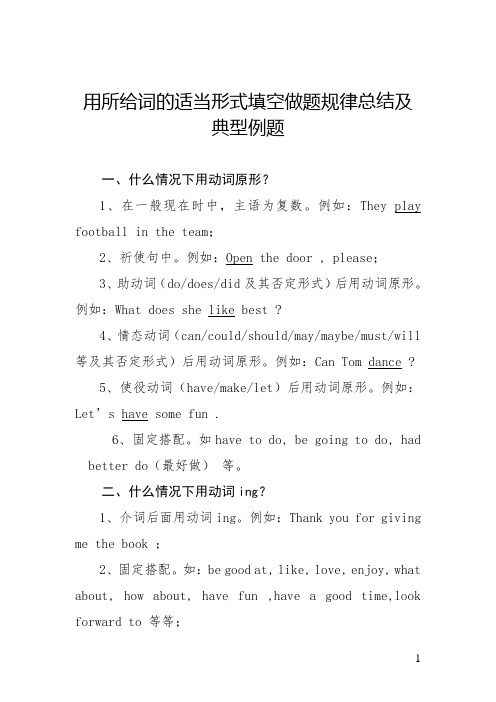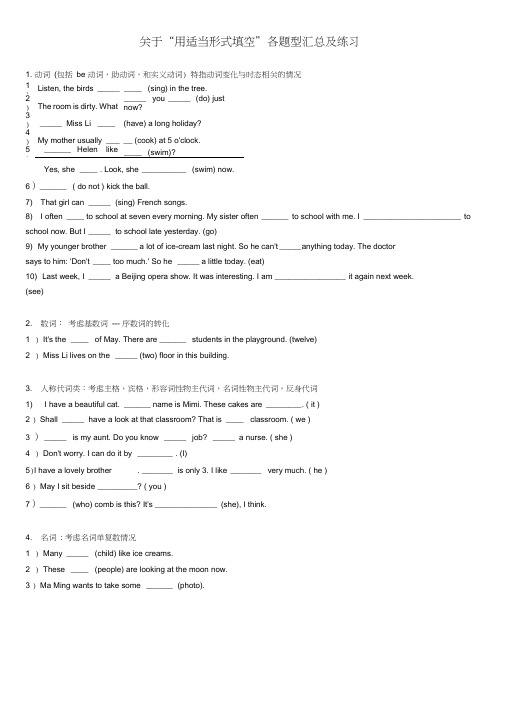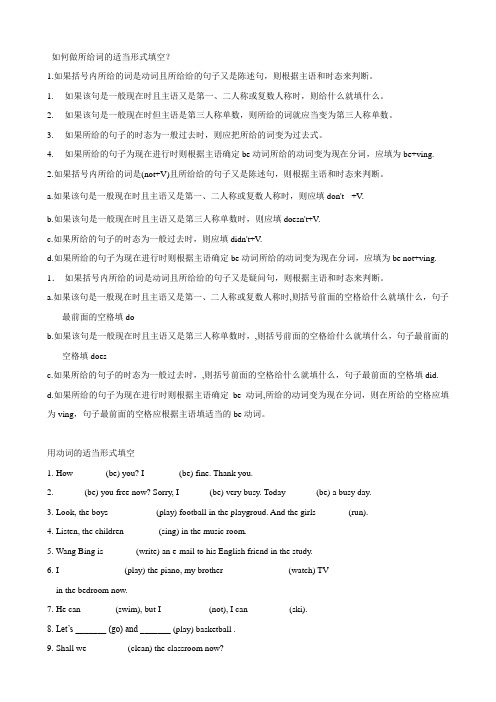用所给词的适当形式填空做题规律总结及典型例题
用所给单词的适当形式填空

详细描述
例如,“他快速地跑过操场”,“她 轻轻地抚摸小猫”,“他们已经成功 地完成了任务”。
详细描述
例如,“他跑得很快”,“她很仔细 地检查了试卷”,“他们已经成功完 成任务”。
规则二:修饰形容词
要点一
总结词
副词可以用来修饰形容词,用以描述形容词所描述的性质 的程度或方式。
要点二
详细描述
例如,“这是一本非常有趣的书”,“她非常漂亮”,“他 们非常友好”。
详细描述
形容词的一般形式就是形容词的原形,例如 “beautiful”、“happy”、“big”等。 使用形容词的一般形式时,需要根据语境判 断其所要表达的含义。
04
副词形式
规则一:修饰动词
总结词
副词修饰动词时,通常放在动词之前, 用以描述动作的方式、程度或时间。
总结词
在某些情况下,副词也可以放在动词 之后,用以强调动作的方式或结果。
总结词
表示过去的动作对现在的影响或结果
详细描述
现在完成时用于描述过去发生的动作 或状态,但这个动作或状态对现在仍
有影响或结果。
例子
I have finished my homework. (我 已经完成了作业。)
02
动词形式
规则一:一般现在时
总结词
表示经常发生的动作或存在的状态。
详细描述
一般现在时用于描述日常习惯、事实、 真理或不变的情况。动词使用一般现 在时形式,如“I eat an apple every day.”(我每天吃一个苹果。)
规则三:修饰副词
总结词
副词可以用来修饰其他副词,用以描述副词所描述的性 质的程度或方式。
详细描述
例如,“他非常已经快速地完成了任务”,“她不太可能 来参加聚会”。
如何做用所给词的适当形式填空

如何做用所给词的适当形式填空用所给词的适当形式填空是中考常见的试题类型之一,旨在考查学生的英语基础知识和综合运用英语的能力。
解此类型的试题可遵循以下步骤:1.明确所给词的词性2.弄清所给句子的意思3.确定空白处所需的词性4.正确写出所填的词用所给词的适当形式填空主要考查以下词类:一. 对名词的考查1.考查名词的单数形式转换成复数形式:(1).名词的单数形式转换成复数形式(规则变化)①一般情况下直接在单数名词之后加-s变为复数名词。
例如:desk→desks , key →keys, monkey →monkeys, boy →boys等②以-x,-s,-ch ,-sh ,结尾的单数名词变为复数名词时,在单数名词之后加-es。
例如:fox→ foxes , boss →bosses ,bus →buses,class →classes, dress →dresses, witness →witnesses, address → addresses, beach → beaches, coach →coaches , couch →couches ,inch →inches ,sandwich →sandwiches , church → churches ,watch → watches ,match →matches ,speech →speeches,witch →witches ,dish →dishes ,brush →brushes ,goldfish →goldfish,fish→ fishes , toothbrush →toothbrushes等。
③以o结尾的单数名词变为复数名词时,在单数名词之后加-s的有:zoo →zoos, radio →radios, photo →photos, piano →pianos, kilo →kilos, mango →mangos, bamboo →bamboos, kangaroo → kangaroos。
【初中英语】 七年级所给词的适当形式填空技巧全解及练习题(含答案)

必备英语【初中英语】必备英语七年级所给词的适当形式填空技巧全解及练习题(含答案)一、七年级英语所给词的适当形式填空1.用方框中所给的短语填空。
(2)________ any books on the desk.(3)________ some boys in the classroom(4)________ a hat in the room?(5)________ any water in the glass.(6)________ any pens in the bag?【答案】(1)There is(2)There aren't(3)There are(4)Is there(5)There isn't(6)Are there【解析】【分析】there is有;there are有;there isn't没有;there aren't没有;is there 有......吗;are there有......吗(1)句意:桌子上有一些肉。
根据句末标点可知是陈述句,some表明句子是肯定句,meat是不可数名词,所以用is,故填There is。
(2)句意:桌子上没有书。
根据句末标点可知是陈述句,any表明句子是否定句,books 是可数名词复数,所以用there aren't,故填There aren't。
(3)句意:教室里有一些男孩。
根据句末标点可知是陈述句,根据some可知是肯定句,boys是复数,所以用are,故填There are。
(4)句意:在房间里有帽子吗?根据句末标点可知是疑问句,hat是单数,所以用is,故填Is there。
(5)句意:被子里没有水。
根据句末标点可知是陈述句,any表明句子是否定句,water 是不可数名词,所以用there isn't,故填There isn't。
(6)句意:包里有钢笔吗?根据句末标点可知是疑问句,pens是复数,所以用are,故填Are there。
用所给词的适当形式填空要点归纳及综合练习.

用所给词的适当形式填空要点归纳【技巧点拨】用动词的适当形式填空”或综合填空”是近5年广州小升初大联盟考试必考题主要考察的知识点有:名词单复数、主谓一致、名词所有格、人称代词和无主代词、数词、动词时态、非谓语动词、国家及国籍、否定表达、形容词和副词等。
下面对各考点进行分析:一、单复数1、名词单复数2、be动词单复数3、代词单复数二、名词所有格This is Happy三、人称代词和物主代词1.人称代词一主格(在句中作主语,陈述句中一般在开头,一般疑问句中一般是第二个单词……2.人称代词一宾格(在句中作宾语,一般用在动词或介词后3.物主代词一形容词性(用在名词前4.物主代词一名词性(相当于一形容词性物主代词+名词II四、基数词和序数词1.基数词表示数量2.序数词表示顺序五、动词一时态1.一般现在时A .主语为第三人称单数,动词要加一-s I或一-es II在否定句或疑问句中,已有did,动词就用原形。
She doesn 'tB .其它情况,动词用原形2.现在进行时----“ be现在分词”song.3.—般过去时A .规则变化:动词词尾加一-ed IIB .不规则变化(have a good time on New Year ' s Day.C .在否定句和疑问句中,已有did ,动词就用原形。
Did you the zoo on Mon day? They did n ' t TV yesterday eve ning.4.一般将来时A . be going to+动词原形B . will+动词原形六、动词一非谓语形式1.不定式2.动名词(play basketball. It ' s time for七、其它1.情态动词+动词原形It means you should n 't2.祈使句中,谓语动词用原形Stan d(sta nd up, please.3.国家和国籍4.形容词和副词He can skate vell(good5.否定Mr Gree n goes to work by bike every day, but Mrs Gree n 【真题演练】1. [2011广州小升初13所民校联考]四.用动词的适当形式填空。
用所给词的适当形式填空做题规律总结及典型例题

用所给词的适当形式填空做题规律总结及典型例题一、什么情况下用动词原形?1、在一般现在时中,主语为复数。
例如:They play football in the team;2、祈使句中。
例如:Open the door , please;3、助动词(do/does/did及其否定形式)后用动词原形。
例如:What does she like best ?4、情态动词(can/could/should/may/maybe/must/will 等及其否定形式)后用动词原形。
例如:Can Tom dance ?5、使役动词(have/make/let)后用动词原形。
例如:Let’s have some fun .6、固定搭配。
如have to do, be going to do, had better do(最好做)等。
二、什么情况下用动词ing?1、介词后面用动词ing。
例如:Thank you for giving me the book ;2、固定搭配。
如:be good at, like, love, enjoy, what about, how about, have fun ,have a good time,look forward to 等等;3、go+动词ing。
例如:go swimming, go shopping, go fishing, go skating等等;4、课程。
Reading lesson, Dancing lesson, Drawing lesson等等5、标识。
No Smoking, No Parking等等;6、动词ing开头做主语。
例如:Smoking is bad for your health.7、进行时态。
Be动词+动词ing。
例如:I am doing my homework now .动词ing变形规则:一般加ing,以e结尾的去e加ing (make、take等,但see除外);以“辅音+元音+辅音”结尾的双写最后一个字母加ing(swim/run)。
(完整版)用适当形式填空解题技巧及练习

关于“用适当形式填空”各题型汇总及练习1. 动词 (包括 be 动词,助动词,和实义动词) 特指动词变化与时态相关的情况 1) Listen, the birds _____ ____ (sing) in the tree. 2) The room is dirty. What _____ you _____ (do) justnow? 3) _____ Miss Li ____ (have) a long holiday?4) My mother usually ___ __ (cook) at 5 o'clock.5) ______ Helen like ______ (swim)? Yes, she ____ . Look, she __________ (swim) now.6 ) ______ ( do not ) kick the ball.7) That girl can _____ (sing) French songs.8) I often ____ to school at seven every morning. My sister often ______ to school with me. I ______________________ to school now. But I _____ to school late yesterday. (go)9) My younger brother ______ a lot of ice-cream last night. So he can't _____ a nything today. The doctorsays to him: 'Don't ____ too much.' So he _____ a little today. (eat)10) Last week, I _____ a Beijing opera show. It was interesting. I am ________________ it again next week.(see)2. 数词: 考虑基数词 --- 序数词的转化1 ) It's the ____ of May. There are ______ students in the playground. (twelve)2 ) Miss Li lives on the _____ (two) floor in this building.3. 人称代词类:考虑主格,宾格,形容词性物主代词,名词性物主代词,反身代词1) I have a beautiful cat. ______ name is Mimi. These cakes are ________ . ( it )2 ) Shall _____ have a look at that classroom? That is ____ classroom. ( we )3 ) _____ is my aunt. Do you know _____ job? _____ a nurse. ( she )4 ) Don't worry. I can do it by ________ . (I)5)I have a lovely brother . _______ is only 3. I like _______ very much. ( he )6 ) May I sit beside _________? ( you )7 ) ______ (who) comb is this? It's ______________ (she), I think.4. 名词 : 考虑名词单复数情况1 ) Many _____ (child) like ice creams.2 ) These ____ (people) are looking at the moon now.3 ) Ma Ming wants to take some ______ (photo).5. 表示国家:考虑国家、语言、人种:1 ) That girl can _____ (sing) French songs.2 ) Yang Ling is a ______ (China) girl.3) Jim is from _______ . He speaks ________ . (Franee)4) Jack is from ______ . He speaks ________ . (German)6. 形容词、副词的比较级、最高级: (详见比较级、最高级专项练习)7. 动词、名词、形容词、副词之间的相互转化:(此处指动词变化与时态无关的情况)1 )动词、形容词的转化a. 词尾加ful:use - useful, care - careful, help - helpful, tha nk - tha nkful, peace - peaceful, forget - forgetful, play -playful, succeed - successful, won der - won derfulb. 词尾加d /ed:please - pleased, unite - united, excite - excited, surprise - surprised, use - used, organize - organized,close - closed, relax - relaxed, develop - developed, appreciate- appreciated , frustrate in terest - in terested,annoy - anno yed, frighte n - frighte ned, crowd - crowded, pollute - pollutedc. 词尾力口 ing:interest - interesting, surprise - surprising, excite - exciting, develop - developing, frighten - frightening,thrill - thrilli ng, frustrate - frustrat ing, relax _ relax in g, live - liv ing, rock - rock ing, sleep - sleep ingd. 词尾变y 为i,加 ed:worry - worried, marry - married, fry - fried, terrify - terrified, satisfy - satisfiede. 词尾加able:know - knowledgeable,enjoy - enjoyabe, suit - suitable, adjust - adjustable, comfort believe - believablef. 词尾加less:care-careless, use-useless, hope-hopelessg. 词尾力口 ive / aive:create-creative, attract-attractive, act-active, talk-talkative, correct - correctiveh. 其它:lose - lost, fool - foolish, live - lively / alive /livi ng, sleep - sleepy / sleep ing / asleep, wake - awake, taste - tasty , speak - spoke n, break - broke n, die - dead, educate - educati on al, world - worldwide, imagine---imagi nary 2)动词、名词的转化: a. 词尾 +mentmove-movement , agree-agreement , govern-government , manage-management equip-equipment , -frustrated, comfortable,argue-argumentb. 词尾+tion/cion/sion :decide-decision, educate-education, dictate-dictation, graduate-graduation, invent-invention,invite-invitation, pollute-pollution, compete, competition, instruct-instruction, conclude-conclusion,express-expression, satisfy-satisfaction, produce-productionc. 词尾+ingswim-swimming, bath-bathing, build-building, learn-learning, write-writingd. 词尾-er/ar/ist/ess ( 表示职业和身份) :beg-beggar ,act-actor ,act-actress, teach-teacher, educate-educator, cook-cooker, wash-washer,e. 词尾-ice;serve-service, note-notice,f. 其他:press-pressure , sit-seat, fly-flight, heat-heat, mix-mixture, ......1) This dictionary is __________ (help).2) The girls likes __________ (sit) quietly.3) He is a __________ (succeed) actor.4) Please read the ________ (note) carefully before writing your answer.5) There is a __________ (beg) under the bridge.3) 名词、形容词的转化:a. 结尾+y :health-healthy, cloud-cloudy, rain-rainy, luck-lucky, sun-sunny, noise-noisy, ice-icy, shine-shiny silk-silky, fur-furry, taste-tasty b. 结尾+ed :spot-spotted, talent-talented, balance-balanced,c. 结尾-ly: ( 注意区分ly 结尾的副词)friend-friendly, love-lovely, live-lovelyd. 结尾-ce 改-t :difference-different, silence-silent, confidence-confidente. 结尾-ous :danger-dangerous, mystery-mysterious,f. 结尾-al:music-musical, medicine-medical, nature-natural, tradition-traditional, origin-original , person-personal,g. 结尾-less/ful:home-homeless, hope-hopeless, beauty-beautiful, meaning-meaningful , color-colorful, pain-painful, thank-thankfulh. 结尾-able :value-valuable, adjust-adjustable, suit-suitable, knowledge-knowledgeable, comfort-comfortablei. 结尾-en:wood-wooden, wool-woolenj. 其他……fool-foolish, freedom-free, love-loving, death-dead, pleasure-pleasant, popularity-popular, pride-proud, scientist-scientific, energy-energetic, height-high4) 形容词、副词的转化:结尾-ly :careful-carefully, lucky-luckily, heavy-heavily, happy-happily, angry-angrily, absolute-absolutely, true-truly,sudden-suddenly, wide-widely, useful-usefully ,possible-possibly8. 一词多词性及其他特殊情况:1)动词、名词同形(意义不同)book, seat, water, shoulder2) 形容词、副词同形:fast, right, late, last, hard, well, straight, high, pretty, tight, short1) That is a very _____ train. It goes very _______ . (fast)2) He is a _______ worker. He works _______ . (hard)3) It is a _______ road. It runs _________ for miles. (straight)4) She is a _________ girl. That is a _________ good picture. (pretty)5) I'm afraid he is not ______ . He can sing _________ . (well)3 )以下词加-ly, 意义完全不同,并非是词性之间的相互转化:early, far, fast, hard, high, late, often, past, right, soon 例句:1) He came late. I haven't seen him lately.2) The team played fair. He did fairly well in his examination.3) My grandparents live quite near. I nearly made a mistake.4) We had to work hard. They could hardly find their way.5) The boy climbed high up the tree. She is highly interested in history.6) He studied deep into the night. He is deeply grateful for our support.7) The car stopped short at the gate. (in an abrupt way; suddenly)He will come shortly (= soon).8) Please be back at 6 o'clock sharp. The father spoke sharply to the boy.9) You guessed wrong. He was wrongly accused of the crime。
如何做“用词的适当形式填空”题

如何做“用词的适当形式填空”题(以下观点均属我个人的经验总结,仅供参考!)“用词的适当形式填空”题是小学阶段一种重要题型,它的难度较大,大多数孩子经常在这道题上丢分。
请家长指导孩子理解并尽可能把以下做题技巧记熟:(一)如果给出的是名词就要考虑该词是可数或不可数名词,如果是可数名词则要考虑单复数问题。
(二)如果给出的词是形容词,则要考虑是用原形、比较级或是最高级,也有可能要把它变成副词。
1、very, so, as, too,后接形容词原形。
2、有than,有much,或明显的两者的比较,用比较级。
3、有介词+范围,如in+范围,of+范围,则用最高级,一定要记得加the。
(三)如果给出的词是动词,则可按以下方法去做。
1、找有没有可直接决定动词形式的词。
(1)直接决定动词用原形① to后按动词原形②情态动词后接动词原形。
③祈使句动词用原形(祈使句可分以下几种)A、以Let开头B、以Don’t开头C、以动词开头D、以please开头④前面有助动词do, does, did, 后面的行为动词用原形2、直接决定动词用ing形式① enjoy, like 后接动词ing形式② go后接动词ing形式,如:go shopping③前有be ( am, is, are ),后面的动词用ing形式(小学阶段适用)如:My mother is cooking (cook) dinner.(二)找可决定时态的词。
1、有Look, Listen, now,用现在进行时,动词形式是be(am, is, are)+动词ing(注意以下情况也用现在进行时)① In this picture, he is riding a bike.②Where is your mother ? She is cooking dinner in the kitchen.2、有always, usually, often, sometimes, every 时间短语,用一般现在时,动词用三单或原形3、有tomorrow, next 时间短语,this时间短语(this morning 常用一般过去时),或明显表示将来的时间,用一般将来时,动词形式为be(am, is, are),going to+动词原形,或will+动词原形4、有yesterday, last 时间短语,just now, 时间段+ago,用一般过去时,动词用过去式,要特别注意,特殊变化的动词过去式。
如何做所给词的适当形式填空

如何做所给词的适当形式填空?1.如果括号内所给的词是动词且所给给的句子又是陈述句,则根据主语和时态来判断。
1.如果该句是一般现在时且主语又是第一、二人称或复数人称时,则给什么就填什么。
2.如果该句是一般现在时但主语是第三人称单数,则所给的词就应当变为第三人称单数。
3.如果所给的句子的时态为一般过去时,则应把所给的词变为过去式。
4.如果所给的句子为现在进行时则根据主语确定be动词所给的动词变为现在分词,应填为be+ving.2.如果括号内所给的词是(not+V)且所给给的句子又是陈述句,则根据主语和时态来判断。
a.如果该句是一般现在时且主语又是第一、二人称或复数人称时,则应填don't+V.b.如果该句是一般现在时且主语又是第三人称单数时,则应填doesn't+V.c.如果所给的句子的时态为一般过去时,则应填didn't+V.d.如果所给的句子为现在进行时则根据主语确定be动词所给的动词变为现在分词,应填为be not+ving. 1.如果括号内所给的词是动词且所给给的句子又是疑问句,则根据主语和时态来判断。
a.如果该句是一般现在时且主语又是第一、二人称或复数人称时,则括号前面的空格给什么就填什么,句子最前面的空格填dob.如果该句是一般现在时且主语又是第三人称单数时,,则括号前面的空格给什么就填什么,句子最前面的空格填doesc.如果所给的句子的时态为一般过去时,,则括号前面的空格给什么就填什么,句子最前面的空格填did.d.如果所给的句子为现在进行时则根据主语确定be动词,所给的动词变为现在分词,则在所给的空格应填为ving,句子最前面的空格应根据主语填适当的be动词。
用动词的适当形式填空1. How_______ (be) you? I________(be) fine. Thank you.2. ______ (be) you free now? Sorry, I ______ (be) very busy. Today_______(be) a busy day.3. Look, the boys___________(play) football in the playgroud. And the girls_______ (run).4. Listen, the children _______ (sing) in the music room.5. Wang Bing is_______ (write) an e-mail to his English friend in the study.6. I_______ _______ (play) the piano, my brother_______ _______ (watch) TVin the bedroom now.7. He can _______ (swim), but I _______ (not), I can _______ (ski).8. Let’s _______ (go) and _______ (play) basketball .9. Shall we _______ (clean) the classroom now?10. It’s time to _______ (have) lunch. Let’s _______ (go).11.I ______(like) _______(skate), but my parents _______(not), they______(like) (swim).12. Miss Green_______ (like) _______ (dance) very much.13. _______ (do) Uncle Wang _______ (run) fast?14. He and his father can _______ (jump) high.15. YangLing is _______ (write) _______ (care) now.16. Look, Mike is _____ (sit) ______ (quiet).17. _______ (do) WangBing usually_______ (surf) the Internet?Yes, he_______ (do).18. Ben _______ (like) _______ (catch) insects on Sundays.19. How many _______ (lesson) do you ______(have) in the morning?20. My parents ________ (get ) up at 6:30, my sister _________ (get ) up at 6:40.And I _________ (get ) up at about 6:00 everyday.21. Is she_______ (do) her homework at home? Yes, she _______ (be).22. Mike’s sister ________ (cook) nice food. I _______ (like) eating it very much.23. Do you _______ (have)any _______ (hobby)? Yes, I _______ (do).24. _______ (do) your father_______ (watch) TV in the evening? No, he_______ (not).25. This is Helen _______ (speak).26. Tom usually_______ (play) football after school.27. Are these your ______ (stamp) ? No, they’re _______ (YangLing)28. He _______ (live) in a small town near Nanjing.29. Pingping_______ _______ (write) an e-mail to his friend now.30. What_______ (do) Nancy usually_______ (do)?She usually_______ (grow) flowers in the evening.31. Y umi is a _______ ( Japan )girl .32. Can you ______(come) and ______(help) ________(I)with _____(I) Maths?33.Children’s Day is _____(come), ourparents would like _____(buy)thingsfor ______(we).34. He is_______ (write) an e-mail to his father.35. I like_______ (cook) and_______ (grow) flowers.36. We _______ (study) English, Chinese, Maths, Science and Art at school.37. I ____(be) late. Don’t ___ (be ) late again.38. Look, the bus ____________ (come).39. My father can ____ (ride) a horse.40. Look! ________your father __________ ( make) model ships over there?41. The students would like __________ (play )football after class.42. What can you _____ (do )? I can _____ (run). But I ________(skate ) now.43.What lessons _____(do) he ____(have) in the morning? He ____( have )four.44. I ______ (go ) to school by bus, and he ______(go) to school by bike.45. _______ she often _______ (write) to you ? Yes, she _______(do).46. Who ________ (sing) beautifully in your class? Jim.47. The _______ (butterfly ) are dancing in the flowers . I like __________ very much .48. Oh,There ____ (be) many pears in the box. ______ (be) they your pears?No, they _____.49 Who______(be) on duty today ?50.Where______(be) my gloves? They_______(be) there just now. I can’t find_______ (it).。
- 1、下载文档前请自行甄别文档内容的完整性,平台不提供额外的编辑、内容补充、找答案等附加服务。
- 2、"仅部分预览"的文档,不可在线预览部分如存在完整性等问题,可反馈申请退款(可完整预览的文档不适用该条件!)。
- 3、如文档侵犯您的权益,请联系客服反馈,我们会尽快为您处理(人工客服工作时间:9:00-18:30)。
用所给词的适当形式填空做题规律总结及典型例
题
一、什么情况下用动词原形?
1、在一般现在时中,主语为复数。
例如:They play football in the team ;
2、祈使句中。
例如:Open the door , please ;
3、助动词(do/does/did 及其否定形式)后用动词原形。
例如:What does she like best ?
4、情态动词(can/could/should/may/maybe/must/will
等及其否定形式)后用动词原形。
例如:Can Tom dance ?
5、使役动词(have/make/let )后用动词原形。
例如:
Let ' s have some fun .
6、固定搭配。
女口have to do, be going to do, had
better do (最好做)等。
二、什么情况下用动词ing ?
1、介词后面用动词ing。
例如:Thank you for giving
me the book ;
2、固定搭配。
女口:be good at, like, love, enjoy, what about, how about, have fun ,have a good time,look forward to 等等;
3、go+动词ing。
例如:go swimming, go shopping, go fishing, go skating 等等;
4、课程。
Reading lesson, Dancing lesson, Drawing lesson 等等
5、标识。
No Smoking, No Parking 等等;
6、动词ing 开头做主语。
例如:Smoking is bad for your health.
7、进行时态。
Be动词+动词ing。
例如:I am doing my homework now .
动词ing 变形规则:一般加ing ,以e 结尾的去e 加ing (make、take 等,但see 除外);以“辅音+元音+辅音”结尾的双写最后一个字母加ing (swim/run )。
三、什么情况下用动词不定式?
1、固定搭配。
如want to do , would like to do ,get to (到达),need to do (需要做),hope/wish to do , plan to do, seem to do (似乎)等;
2、固定句型。
如It takes/took sb. time/money to do sth;lt is + 形容词+for sb.+ to do sth ;tell/ask sb. to do ;
3、表目的。
例如:To keep fit , Tomexercises every day . (为了保持健康,汤姆每天锻炼)
4、特殊疑问词+不定式做宾语。
如:How to get to the railway station
5、与too、enough 连用表结果。
女口:The bag is too heavy to carry. (这个包太重了以至于我搬不动)
6、动词不定式做定语。
如:I always have a lot of jobs to do . (我总是有许多工作要做)
四、什么情况下用动词三单形式?在主语为第三人称单数、时
态为现在时态的情况下,动
词用三单形式。
例如:She often plays cards in the park .
动词三单变化规则:一般加s,以s,sh,ch,x,o 结尾的加es (如wash/go/fix/watch ),以辅音加y结尾的变y为ies (如
study/carry ); 以f/fe 结尾的变f/fe 为ves (knife/thief )。
五、什么情况下用过去式?
当题目时态为过去时态,动词用过去式。
如:yesterday,last week ,three days ago, in 2000, before, at that time, once, in the past, this morning, just now, the other day, at that moment .
过去式变形规则:be动词(was,were);助动词(did);实义动词:一般加ed,以e结尾加d (dance,live ),以辅音字母+y 结尾变y 为i+ed (study,carry );以元音字母加辅音字母结尾双
写最后一个字母加ed(plan/stop );不规则(have/take/make )。
六、名词有哪些变形?
two
1、当主语为复数时,可数名词要用复数形式。
如
many, a lot of , lots of, some, Tom and Lily 等。
2、当主语是不可数名词时,be动词要用单数形式。
如:There is some milk in the fridge.
3、名词变形容词。
beauty —beautiful, meaning —meaningful, wind —windy, cloud —cloudy,sun —sunny .
七、动词变形有几种情况?
1、动词原形;
2、动词不定式(to do);
3、动词ing ;
4、动词三单;
5、动词过去式;
6、动词后加er、r或or变职业 (女口drive —driver, sing —singer, teach —teacher, visit —visitor, 注意cook既可以做动词也可以做名词)。
八、人称的变化
动词后面一般用宾格,如:I like him (he) very much; 介词后一般用宾格,如:I have a gift for her (she) ;当表示“...的”时,用所有格,如:Our (we)school is big and beautiful ;当表示“… 自己”时,用反身代词。
如:Lily goes to the cinema herself (she).
九、典型例题
1、Mr Li (like) playing table tennis.
2、What Miss Green (do)? -She' s a (farm)
3、What do you like (play)?
4、There (be) some bread on the small table.
5、I have two (foot).
6、Helen is very good at (swim).
7、What would you like (eat)?
8、Let ' s (go) to the park.-Great!
9、I have two (read) lessons every day.
10、There is a sign “ No (smoke) ” on the tree.
11、Could you tell mehow (get) to the station?
12、We have a (run) lesson this afternoon.
13、How many (toy) do you have?
14、He can (make) cakes.
15、Don' t (skate) on the ice.
16、Can you show (I) your pictures?
17、His mother is a (work)in the factory.
18、Today is (sun).
19、We (go) to the museum last week.
20、Her father is best (cook)at the restaurant.。
